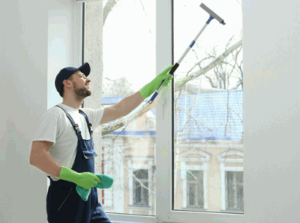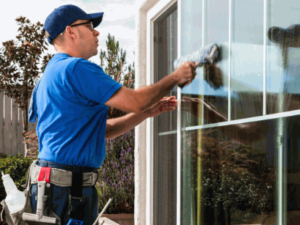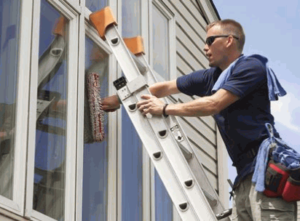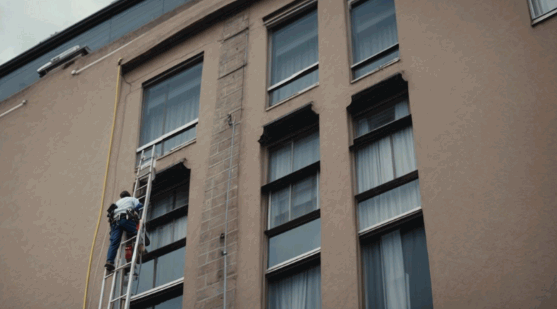Have you ever wondered what it takes to become a window cleaner? Or perhaps you’re curious about how much they get paid?
In this article, we’ll explore the job of a window cleaner, the requirements to become one, and the factors that affect their pay. We’ll also delve into the various ways window cleaners can increase their earnings.
Whether you’re considering a career as a window cleaner or just want to learn more about the profession, this article has got you covered. So, let’s dive in and find out more about this often-overlooked profession!

What Is The Job Of A Window Cleaner?
Window cleaners are professionals responsible for cleaning windows in various settings, such as commercial and residential properties, to maintain a professional and clean appearance.
Window cleaners often work at heights and must follow strict safety protocols to prevent accidents. They may also inspect windows for damage, inform clients of any issues, and recommend necessary repairs.
Professional standards for window cleaners include attention to detail, punctuality, and effective communication with clients. The compensation for this job varies based on experience, location, and the type of property being serviced, with industry averages ranging from $12 to $25 per hour.

What Are The Requirements To Become A Window Cleaner?
Becoming a window cleaner requires a combination of experience, skills, and adherence to safety regulations, along with professional certifications to ensure competency and reliability in the industry.
Having experience working at heights and knowledge of various cleaning techniques for different types of windows is essential for this job. It’s also important to be able to handle specialized equipment. Safety is a top priority, so having a strong focus on safety protocols, including proper ladder usage and harness techniques, is crucial.
Obtaining professional certifications, such as the International Window Cleaning Association (IWCA) certification, can add credibility and showcase expertise in the field. Additionally, attention to detail, physical fitness, and good communication skills are highly valued traits in this profession.
Physical Fitness
Physical fitness is crucial for window cleaners due to the demanding nature of the job, which often involves climbing, reaching, and carrying equipment while ensuring safety and efficiency.
Maintaining strength and agility is essential for window cleaners. They need to effectively maneuver and hold themselves steady while working at heights. Endurance is also important as window cleaning requires sustained physical effort over extended periods.
Being physically fit reduces the risk of injuries and allows cleaners to complete tasks with precision and attention to detail. This ultimately contributes to the overall quality of their work.

Attention To Detail
Attention to detail is a fundamental requirement for window cleaners, as they must ensure thorough cleaning and inspection of windows to maintain quality standards and client satisfaction.
Professional window cleaners stand out from the rest with their meticulous attention to every nook, cranny, and smudge. They carefully assess and clean each pane, frame, and sill to achieve pristine results. By diligently examining the condition of the windows, identifying imperfections and streaks, and attending to every spot, window cleaners demonstrate their dedication to delivering impeccable service.
This level of precision not only enhances the aesthetic appeal of the property but also reflects a commitment to providing a high-quality outcome. With their attention to detail, professional window cleaners leave no room for error, ensuring that every window shines with perfection.
Ability To Work At Heights
The ability to work at heights is essential for window cleaners. This requires compliance with safety regulations, proficient ladder use, and adherence to fall protection measures to ensure personal safety and job effectiveness.
Window cleaners face numerous challenges when working at heights. These include navigating around obstacles, dealing with adverse weather conditions, and managing heavy equipment. Safety regulations require regular equipment inspections and proper training in ladder usage and fall protection techniques to minimize accidents. Utilizing harnesses, guardrails, and safety nets provides crucial support while understanding weight limitations and body positioning when using ladders ensures stability.
To maintain a safe working environment, window cleaners must continually assess and address potential hazards throughout their tasks. This includes following safety regulations, utilizing proper equipment, and staying vigilant at all times.

Knowledge Of Cleaning Products And Equipment
Window cleaners need extensive knowledge of cleaning products and equipment, including various window washing tools, squeegees, and cleaning solutions, to achieve optimal results and efficiency in their work.
To effectively clean windows at varying heights and angles, it’s essential to be familiar with specific tools such as extension poles, scrapers, and microfiber cloths. Additionally, choosing the right cleaning solutions is crucial, such as using ammonia-based cleaners for tough grime and non-abrasive solutions for delicate glass. This ensures a thorough cleaning without causing damage.
Proper techniques, such as using the S-pattern squeegee method, are also essential for achieving a professional and successful window cleaning service. It’s also important to regularly maintain and care for tools to ensure their effectiveness.
How Much Do Window Cleaners Get Paid?
Window cleaners receive compensation based on various factors, including hourly pay, annual income, and overall job outlook within the industry. The potential for competitive earnings is based on experience and demand.
The average hourly pay for window cleaners ranges from $12 to $25, depending on location and level of expertise. This equates to an annual income of around $25,000 to $50,000 for full-time workers.
The job outlook for window cleaners is expected to grow in line with the construction and real estate industries, offering steady employment opportunities. Experienced window cleaners may have the potential to earn more through specialized services and higher demand in urban areas.

Hourly Rates
Hourly rates for window cleaners vary based on factors such as market demand, job satisfaction, and prevailing wages, offering a variable compensation structure that reflects the industry’s dynamics.
In major metropolitan areas, where demand is high and the cost of living is steep, window cleaners may command higher hourly rates compared to smaller towns.
The prevailing wages set by industry standards and local regulations play a crucial role in determining the baseline for hourly rates. This fluidity in compensation can significantly impact job satisfaction and motivation for window cleaners, as they seek fair remuneration for their expertise and effort.
Salary
Some window cleaners opt for salaried positions, which may offer additional employee benefits and job security, providing a more stable income structure compared to hourly wages.
Salaried positions offer a variety of benefits, such as health insurance, retirement plans, paid vacation, and sick leave. In addition, employees in salaried positions enjoy a sense of stability with a consistent monthly income, regardless of fluctuations in work hours. This predictability allows for better financial planning and peace of mind.
Furthermore, salaried positions often come with opportunities for career advancement and professional development, leading to higher job satisfaction and long-term security for window cleaners.
Commission
Commission-based earnings are common for window cleaners who engage in subcontracting or operate their own window cleaning business. This often involves considerations for business expenses and revenue sharing.
This compensation model incentivizes window cleaners to actively seek out new clients and provide high-quality service, as their earnings are directly tied to the amount of work they take on.
Subcontracting arrangements may allow window cleaners to take on more jobs than they could handle alone, while also sharing a portion of the revenue with the main contractor. Managing business expenses such as equipment, insurance, and transportation is essential for maintaining profitability in this competitive industry.
Tips
Window cleaners may receive tips from satisfied customers, reflecting positive customer relations and a high level of customer satisfaction resulting from exceptional service quality.
Providing thorough and efficient service is key to maximizing earnings for window cleaners. Customers are more likely to show their appreciation through tips when they receive top-notch service. Prioritizing customer satisfaction is crucial for cleaners as it directly impacts their tip earnings.
To foster positive relations with customers, it’s important for window cleaners to maintain a friendly and professional demeanor. This can lead to higher chances of receiving generous tips. By focusing on service quality and nurturing strong customer relationships, cleaners can significantly impact their overall earnings.
Bonuses
Bonuses for window cleaners are often tied to performance evaluation and can serve as incentives for career advancement and continuous improvement in job performance and client satisfaction.
These bonuses can play a significant role in motivating window cleaners to excel in their work, leading to improved service quality and client satisfaction. They provide a clear pathway for career progression within the industry, rewarding hard work and dedication.
By aligning bonuses with performance metrics, window cleaners are encouraged to continually enhance their skills and efficiency, ultimately contributing to a more positive and successful client experience.
What Factors Affect The Pay Of Window Cleaners?
The pay of window cleaners is influenced by various factors, including geographic location, demand for services, and opportunities for business growth, leading to diverse compensation trends within the industry.
Window cleaners operating in densely populated urban areas may benefit from higher demand for their services, leading to increased pay rates. Regions with a higher cost of living often see higher wages for window cleaners to align with the economic conditions.
As businesses and residential areas continue to expand, there is a growing demand for window cleaning services, creating more opportunities for higher pay and potential business growth.
Dive into details: What Pressure To Wash Deck
Location
Location plays a pivotal role in determining the pay of window cleaners. Factors such as cost of living, economic conditions, and regional variations all impact compensation levels.
Window cleaners in urban areas with high costs of living may command higher wages to offset expenses. The economic dynamics of a region, including thriving industries or businesses, can also influence demand for window cleaning services and affect pay rates.
Regional variations in economic prosperity and market demand further contribute to disparities in compensation levels for window cleaners across different areas.
Experience And Skills
The experience and skills of window cleaners significantly influence their pay, with opportunities for career advancement and specialized training programs providing avenues for enhancing earning potential.
Experienced window cleaners often have the opportunity to take on leadership roles, such as supervising a team or managing their own cleaning business. These roles can lead to higher compensation.
Training programs focused on safety protocols, advanced cleaning techniques, and customer service skills not only improve their performance but also open doors to higher-paying positions. Continuous skill development in areas such as working at heights and handling specialized cleaning equipment can further boost their earning potential in this profession.
Type Of Employment
The type of employment, whether self-employment or traditional employment, can significantly affect the pay structure for window cleaners. This can influence factors such as employee benefits and income stability.
As a self-employed window cleaner, you have the freedom to determine your rates and negotiate contracts directly with clients. However, this also means taking on responsibilities such as managing taxes, health insurance, and retirement savings.
Alternatively, working for a company may offer benefits like health insurance, paid time off, and a more stable income. It’s important to consider how your employment type can affect your earning potential and job security as a window cleaner.
Company Size
The size and scope of the window cleaning company can impact the pay of window cleaners, with larger companies offering the potential for diversification, business growth, and varied compensation structures.
When it comes to business management, larger companies tend to have more resources at their disposal. This often leads to more structured and competitive compensation packages for their window cleaners. These companies may also have the ability to offer a wider range of window cleaning services, such as residential and commercial, which can give window cleaners the opportunity to expand their skill set and potentially earn higher compensation.
As a company grows in size, there is typically a greater potential for diverse compensation structures. This can include performance-based bonuses and benefits that smaller companies may not be able to offer.
Demand For Services
The demand for window cleaning services directly affects the pay of window cleaners. Effective marketing strategies and client referrals can contribute to increased job opportunities and earnings potential.
This impact on compensation emphasizes the importance of leveraging marketing initiatives to attract and retain clients. High demand for services creates opportunities for window cleaners to maximize their earning potential by effectively promoting their expertise.
Client referrals play a crucial role in expanding their customer base, leading to a steady flow of job opportunities and enhanced compensation. By capitalizing on service demand and implementing strategic marketing efforts, window cleaners can elevate their visibility and solidify their position in the competitive market.
How Can Window Cleaners Increase Their Earnings?
Window cleaners have various avenues to increase their earnings, including obtaining certifications, expanding their client base, and building a strong reputation through exceptional service quality.
Obtaining recognized certifications in window cleaning can enhance professionals’ credibility and allow them to charge higher rates, making them more attractive to lucrative clients.
Actively seeking opportunities to expand their client base through targeted marketing efforts and networking can result in a steady influx of new business.
Fostering a reputation for reliability, attention to detail, and customer satisfaction can lead to repeat business and positive referrals, further solidifying professionals’ position in the market.
Expand Services Offered
Expanding the range of services offered by window cleaners can lead to business growth and increased earnings. This can be achieved by specializing in high-rise or commercial properties.
By branching out into specialized areas, window cleaners can attract a wider clientele base and differentiate themselves from competitors. This can also open doors to lucrative contracts and long-term partnerships, resulting in a boost in revenue.
Expanding service offerings allows window cleaners to tap into new markets and meet the varying needs of different customer segments. This enhances their overall business potential and profitability.
Increase Efficiency
Improving work efficiency through sustainable practices and advanced window cleaning techniques can contribute to enhanced earnings for window cleaners by optimizing time and resources.
This focus on efficiency not only benefits the professionals but also positively impacts the environment by reducing the use of harmful chemicals and conserving water.
Implementing innovative tools and methods, such as water-fed poles and advanced cleaning solutions, can enhance the speed and effectiveness of the cleaning process.
By prioritizing efficiency, window cleaners can complete more jobs in less time, ultimately leading to higher profits and greater customer satisfaction.
Gain Certifications And Specializations
Acquiring industry-relevant certifications and specializations can elevate the expertise and earning potential of window cleaners within the competitive market. Safety training and advanced techniques are essential components of professional development in this field.
Certifications like the International Window Cleaning Association (IWCA) certification can provide recognition and validate the skills of window cleaners.
Specialized training in rope access techniques or high-rise window cleaning can open doors to higher-paying opportunities.
By investing in professional development, window cleaners can demonstrate their commitment to safety and excellence, positioning themselves as valuable assets in the industry.
With the demand for skilled and certified window cleaners on the rise, these qualifications can significantly enhance career prospects and income potential.
Build A Strong Reputation And Client Base
Fostering a strong reputation and expanding the client base through exemplary customer satisfaction can significantly enhance the earnings of window cleaners, leading to sustained business growth and increased demand.
This growth in demand directly correlates with the potential for higher income. Satisfied clients are more likely to recommend the services to others, further expanding the customer base.
A positive reputation can lead to higher-paying and more frequent jobs. Customers are willing to invest more in businesses they trust. Window cleaners who prioritize client satisfaction and actively manage their reputation can reap the benefits of a loyal client base and increased earning potential.

